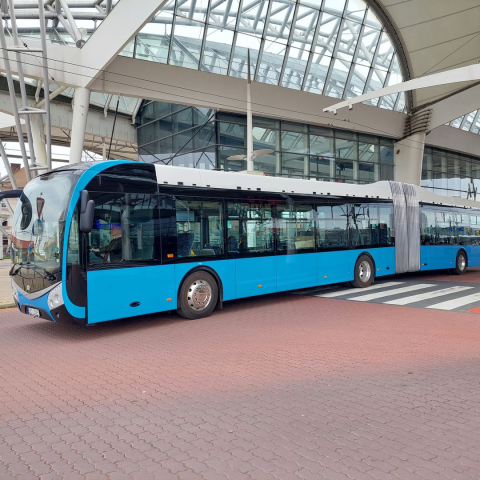Slovakia, SOR and Skoda will supply up to 30 articulated e-buses to Košice (to be charged via overhead system)
The consortium of SOR Libchavy and Škoda Group has signed a framework contract with Košice Public Transport Company, in Slovakia, for the delivery of up to 30 articulated 18-metre electric buses in the second largest city in the country. What is worth noticing, the vehicles are set to be charged during the day directly on […]

The consortium of SOR Libchavy and Škoda Group has signed a framework contract with Košice Public Transport Company, in Slovakia, for the delivery of up to 30 articulated 18-metre electric buses in the second largest city in the country.
What is worth noticing, the vehicles are set to be charged during the day directly on the route via collectors connected to the existing tram and trolleybus overhead system in Košice.
The first phase will see the delivery of 11 vehicles, with an option for a further 19 electric buses. The total value of the contract, including the option, is CZK 610 million (over 24 million euros). Delivery of the first vehicles is scheduled for the turn of 2025 and 2026.
SOR and Skoda to deliver e-buses in Košice
These buses are fully low-floor and equipped with the latest permanent magnet traction motors, ensuring high efficiency and low energy consumption, Skoda underlines. The vehicles are also equipped with traction converters based on silicon carbide (SiC) technology, which contributes to the efficiency and long-term durability of the components.
Passengers can enjoy a comfortable environment with air conditioning, modern information boards, an automatic passenger counting system and Wi-Fi connectivity. Safety is ensured by internal camera systems and a reversing camera. A pantograph camera is also included.
“We are proud to have concluded this important contract with Košice Public Transport Company, which represents a further step towards strengthening our position in the market for modern and environmentally friendly means of transport. This project will provide the citizens of Košice with a modern and comfortable form of public transport and will contribute to the city’s ambition to become a leader in the electrification of public transport in Slovakia. We believe that our electric buses will make a significant contribution to the sustainable development of urban mobility,” said Filip Murgaš, Managing Director and Sales Director of SOR Libchavy.
“The unique charging system allows charging of electric buses during the day directly on the route via collectors connected to the existing tram and trolleybus overhead system in Košice. This system greatly increases the flexibility and operational efficiency of the fleet. The vehicles are therefore modern not only in terms of interior comfort and excellent driving characteristics, but also in terms of the electric technology that is at the heart of the new electric buses,” explained Radek Svoboda, Managing Director Škoda Electric at Škoda Group.







